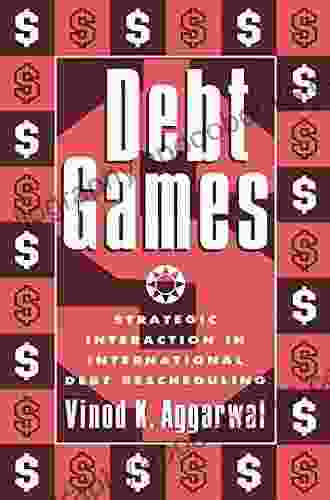Unraveling the Debt Labyrinth: Strategic Interaction in International Debt Rescheduling

The global financial landscape is a complex web of financial instruments and international obligations. Among these, sovereign debt stands as a particularly intricate and consequential phenomenon, often leading to situations where countries find themselves in the throes of unsustainable debt burdens. Debt Games: Strategic Interaction in International Debt Rescheduling delves into this multifaceted world, shedding light on the strategic dynamics that shape the process of international debt rescheduling.
The Anatomy of International Debt
To fully comprehend the intricacies of debt rescheduling, it is essential to understand the anatomy of international debt. Sovereign debt refers to the financial obligations of governments to foreign creditors, typically consisting of loans from international organizations, banks, and other countries. These debts often arise due to various factors, including economic downturns, fiscal imbalances, and geopolitical events.
4 out of 5
| Language | : | English |
| File size | : | 82522 KB |
| Screen Reader | : | Supported |
| Print length | : | 632 pages |
Debt rescheduling becomes necessary when a country faces difficulties in servicing its debt obligations. It involves renegotiating the terms of the debt, such as extending the repayment period, reducing the principal amount, or lowering interest rates. This process is often complex and fraught with challenges.
Strategic Interactions in Debt Rescheduling
Debt Games delves into the strategic interactions that characterize international debt rescheduling. It highlights the interplay between debtors and creditors, examining the motivations and strategies employed by each party. Debtors seek to minimize the economic and political costs of debt servicing, while creditors aim to maximize their recovery.
The book provides a nuanced understanding of the bargaining power dynamics between debtors and creditors. It illustrates how factors such as economic leverage, political influence, and international support can shape the outcomes of debt rescheduling negotiations.
Cooperative and Non-Cooperative Games
Debt Games analyzes debt rescheduling using both cooperative and non-cooperative game theory models. Cooperative models assume that debtors and creditors can communicate and coordinate their actions to reach mutually beneficial outcomes. Non-cooperative models, on the other hand, assume that each party acts independently, pursuing its own interests without regard for the other party's welfare.
The book demonstrates that both cooperative and non-cooperative approaches can provide valuable insights into the dynamics of debt rescheduling. Cooperative models highlight the potential for mutually beneficial solutions, while non-cooperative models shed light on the potential for conflict and suboptimal outcomes.
Case Studies and Empirical Evidence
Debt Games complements its theoretical analysis with detailed case studies and empirical evidence. It examines historical examples of debt rescheduling, including the Latin American debt crisis of the 1980s and the Greek debt crisis of the 2010s. These case studies provide rich insights into the strategic interactions and outcomes of debt rescheduling in the real world.
The book also draws on empirical data to test and validate its theoretical models. It analyzes statistical patterns in debt rescheduling outcomes, identifying factors that influence the likelihood of successful negotiations and the distribution of costs and benefits between debtors and creditors.
Policy Implications and Recommendations
Debt Games concludes by distilling policy implications and recommendations for improving the effectiveness of international debt rescheduling. It argues for a balanced approach that combines cooperative and non-cooperative strategies, tailored to the specific circumstances of each case.
The book also calls for greater transparency and accountability in debt rescheduling processes. It advocates for the involvement of international institutions and civil society organizations to ensure that debt rescheduling is conducted in a fair and equitable manner.
Debt Games: Strategic Interaction in International Debt Rescheduling is a seminal work that advances our understanding of the intricate and challenging world of sovereign debt. Its rigorous analysis of strategic interactions, supported by case studies and empirical evidence, provides invaluable insights for policymakers, economists, and anyone seeking to navigate the complexities of international debt rescheduling.
4 out of 5
| Language | : | English |
| File size | : | 82522 KB |
| Screen Reader | : | Supported |
| Print length | : | 632 pages |
Do you want to contribute by writing guest posts on this blog?
Please contact us and send us a resume of previous articles that you have written.
 Book
Book Novel
Novel Page
Page Chapter
Chapter Text
Text Story
Story Genre
Genre Reader
Reader Library
Library Paperback
Paperback E-book
E-book Magazine
Magazine Newspaper
Newspaper Paragraph
Paragraph Sentence
Sentence Bookmark
Bookmark Shelf
Shelf Glossary
Glossary Bibliography
Bibliography Foreword
Foreword Preface
Preface Synopsis
Synopsis Annotation
Annotation Footnote
Footnote Manuscript
Manuscript Scroll
Scroll Codex
Codex Tome
Tome Bestseller
Bestseller Classics
Classics Library card
Library card Narrative
Narrative Biography
Biography Autobiography
Autobiography Memoir
Memoir Reference
Reference Encyclopedia
Encyclopedia Kl Donn
Kl Donn Lauran Paine
Lauran Paine James W Haefner
James W Haefner Erzabet Bishop
Erzabet Bishop Izzy Bayliss
Izzy Bayliss Dazjon Tinae
Dazjon Tinae Peter K Friz
Peter K Friz Deborah Edmisten
Deborah Edmisten Wendy Raven Mcnair
Wendy Raven Mcnair Ken Hyland
Ken Hyland Robert J Goldstein
Robert J Goldstein Scott Straughan
Scott Straughan David T Conley
David T Conley Travis Baldree
Travis Baldree Deborah G Felder
Deborah G Felder Ted Gup
Ted Gup Nicola Quinn
Nicola Quinn Liz Hurley
Liz Hurley Deana Heath
Deana Heath Lily Prellezo
Lily Prellezo
Light bulbAdvertise smarter! Our strategic ad space ensures maximum exposure. Reserve your spot today!

 Kevin TurnerFlying By The Seat Of My Knickers: An Hilarious Adventure Through The World...
Kevin TurnerFlying By The Seat Of My Knickers: An Hilarious Adventure Through The World... Ernest ClineFollow ·5.1k
Ernest ClineFollow ·5.1k Mark MitchellFollow ·13.8k
Mark MitchellFollow ·13.8k Anton FosterFollow ·8.9k
Anton FosterFollow ·8.9k Neil GaimanFollow ·2.8k
Neil GaimanFollow ·2.8k Aubrey BlairFollow ·11.3k
Aubrey BlairFollow ·11.3k Nathaniel HawthorneFollow ·2k
Nathaniel HawthorneFollow ·2k Ibrahim BlairFollow ·7k
Ibrahim BlairFollow ·7k Darren NelsonFollow ·15.9k
Darren NelsonFollow ·15.9k

 Finn Cox
Finn CoxEmpowering School-Based Professionals: A Comprehensive...
: The Role of School-Based Professionals in...

 F. Scott Fitzgerald
F. Scott FitzgeraldThe Santa Fe Trail Twentieth Century Excursion: A...
Get ready to embark on an...

 Kendall Ward
Kendall WardThe Ultimate Trivia Guide to Bruce Springsteen and the...
Bruce Springsteen...

 Jedidiah Hayes
Jedidiah HayesThe Trouble with Lacy Brown: Texas Matchmakers - A...
Prepare to be swept...
4 out of 5
| Language | : | English |
| File size | : | 82522 KB |
| Screen Reader | : | Supported |
| Print length | : | 632 pages |














